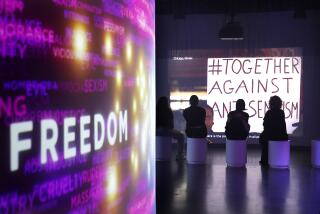From Prosecutor to Counselor : Legal system: Federal attorney was spurred by the belief that, beyond prison terms, education was needed to address the roots of racism and hatred.
Operation Grow Hair would never have come about without Marc R. Greenberg.
Greenberg, an enterprising federal prosecutor with a wry sense of humor, spent months reviewing the mountain of audio and videotape accumulated during the FBI investigation of the Fourth Reich Skinheads, and he became convinced that merely sending a few members to prison would leave a troubling problem unresolved.
For the two skinheads who admitted their guilt, prison seemed unlikely to quell their racism. For the dozen or so who were not charged, the prosecution of their friends seemed more likely to harden their hatred than to lessen it.
“You can teach through the penalty phases that there are consequences,” he said. “But that doesn’t address the underlying hatred. I felt we needed to try to do something about that.”
U.S. Atty. Terree A. Bowers shared Greenberg’s concerns. So, with Bowers’ advice and encouragement, Greenberg set out to design a counseling program.
But Greenberg is the first to admit that his business is prosecuting cases, not counseling teen-agers. So he assembled a committee of volunteers to seek their suggestions. Representatives of a dozen or so organizations participated, but three groups and one individual emerged as the central players: the Simon Wiesenthal Center, the American Jewish Committee, the Martin Luther King Dispute Resolution Center and Donna Sears, a litigation consultant who is a longtime friend and colleague of Greenberg. She coordinated the planning and took personal charge of many aspects of the program.
Logistics were a problem from the start: U.S. marshals originally planned to provide transportation, but budget cuts forced them out of the program. Authorities in Washington insisted that Christopher David Fisher not be loosed upon the community, even for counseling and even under guard. As a result, he spent all three days in handcuffs chained to his waist.
But the most difficult question that the group confronted was a tactical and philosophical one. Were the goals of the program best accomplished by challenging the youths’ beliefs or by encouraging them to respect others? Was it to be the carrot or the stick?
Each side had its advocates. Wiesenthal Center officials argued against coddling. Leaders of the American Jewish Committee’s Hands Across the Campus program strongly urged that the counseling not be punitive.
“There was a lot of vindictiveness at first,” said Gail Byrne, a Hands Across the Campus leader. “Some people were saying: ‘Let’s rub their faces in it.’ We happen to come from a very different perspective. These are all our kids.”
What emerged was a compromise that avoided turning the counseling either into a day care for angry youths or a tool for adult vengeance.
The visits to court and the county jail were designed to expose the skinheads to the consequences of breaking the law. The day with the students from Hands Across the Campus was intended to show them the value of other cultures and people. And the final day was intended to put them face to face with the people for whom they seemed to harbor such intense hatred: several rabbis, two Holocaust survivors and leaders of the First African Methodist Episcopal Church.
“If this is about anything, it’s about choices,” Sears said. “We want to show these young people that they have choices. The choices that they make are up to them.”
More to Read
Sign up for Essential California
The most important California stories and recommendations in your inbox every morning.
You may occasionally receive promotional content from the Los Angeles Times.











